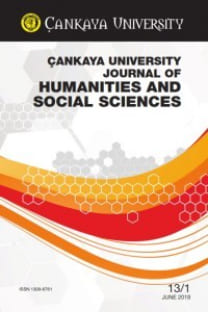The Self-Revelatory Tendencies of The Pardoner in the Canterbury Tales
The Pardoner is the last of the pilgrims to be described in the General Prologue. Although Chaucer asks for forgiveness for not placing the pilgrims in their proper degree, this has some humiliating connotations to the minds of the readers. Putting the Pardoner last in the General Prologue, Chaucer suggests that he is like an unpleasant thought coming into existence slowly in the minds referring to his being narrated as one of the most wicked characters of all.1 There might also be literary and artistic reasons for mentioning the Pardoner at the end of the character list. It is clear that Chaucer has been particularly interested in him in the Pardoner’s Prologue and Epilogue and he reveals more about him than about any other pilgrims except the Wife of Bath.
Anahtar Kelimeler:
Pardoner, Self-Revelatory, Tendencies
The Self-Revelatory Tendencies of The Pardoner in the Canterbury Tales
Keywords:
-,
___
- Bloom, Harold, (1988). Geoffrey Chaucer’s the Pardoner’s Tale (New York: Chelsea House Publishers).
- Boeing, Robert, (2000). “The Pardoner’s Hypocrisy and His Subjectivity,” ANQ, 13. pp.9-15.
- Boitani, Piero and Mann, Jill, (1986) (ed.), The Cambridge Companion to Chaucer (Cambridge: Cambrid- ge University Press).
- Edmund, Reiss. (1964), “The Final Irony of the Pardoner’s Tale. College English,” 25 pp.260-266.
- Ellis, Steve, (ed.), (2005), Chaucer an Oxford Guide (London: Oxford University Press.)
- Helen, Phillips. (2000) An Introduction to the Canterbury Tales (New York: St. Martin’s Press).
- Lester, Geoffrey. (1987), Macmillan master guides the Pardoner’s Tale by Geoffrey Chaucer (Houndmills: Macmillan Education Ltd.).
- Edmund Reiss, “The Final Irony of the Pardoner’s Tale. College English,”, p.264.
- Edmund Reiss, “The Final Irony of the Pardoner’s Tale. College English,”, p.262.
- Malo, Robyn, (2008). “The Pardoner’s Relics (and why they matter the most),” The Chaucer Review, 43, pp.82-102.
- Morgan, Gerald, (1976). “The Self-Revealing Tendencies of Chaucer’s Pardoner,” Modern Language Re- view, 71. pp.241-255.
- Spearing, A. C., (1965) The Pardoner’s Prologue & Tale (Cambridge: Cambridge University Press).
- ISSN: 1309-6761
- Yayın Aralığı: Yılda 2 Sayı
- Başlangıç: 2004
- Yayıncı: Çankaya Üniversitesi
